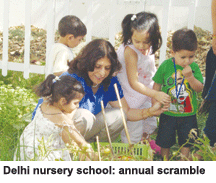January has been a stressful month for young parents of two-four year olds in Delhi, scrambling to get their children admitted into reputed private nursery schools of the NCR (National Capital Region, which includes Delhi, Gurgaon, Noida, and Ghaziabad). In most metros across the country — and especially Delhi — admission of tiny tots into the nursery sections of the city’s most highly-ranked K-12 private schools is a matter of utmost importance as it ensures smooth progression of children right up to class XII, as vacancies in higher classes are rarely available.
Therefore policies related to admission into the most highly-rated pre-schools and nurseries have been contentious issues for several decades, involving flip-flops on nursery admission guidelines, confusion about cut-off ages, arbitrarily priced prospectuses and the sale and availability of admission forms, etc. All this has prompted several NGOs to file PILs (public interest litigations) against nursery school managements perceived to be profiting from capacity shortages, which in turn has resulted in inter-ventions by the Delhi high court and the Union HRD ministry.
 Following considerable litigation and court orders in the first quinquennium of the new millennium and widespread protests by leftist NGOs, especially the Delhi-based NGO Social Jurist promoted by activist-advocate Ashok Agarwal, complaining of class-biased and “cruel” interviews of tiny children by elite school managements, in 2006 a committee headed by Ashok Ganguly, the then chairman of the Central Board of Secondary Education (CBSE), was constituted to formulate admission norms into nursery/pre-primary schools.
Following considerable litigation and court orders in the first quinquennium of the new millennium and widespread protests by leftist NGOs, especially the Delhi-based NGO Social Jurist promoted by activist-advocate Ashok Agarwal, complaining of class-biased and “cruel” interviews of tiny children by elite school managements, in 2006 a committee headed by Ashok Ganguly, the then chairman of the Central Board of Secondary Education (CBSE), was constituted to formulate admission norms into nursery/pre-primary schools.
The Ganguly Committee submitted its report which prohibited all testing and interviews of children and their parents, recommending that pre and K-12 schools decide a child’s eligibility based on a 100 point scale — 20 points weightage for neighbourhood children, 10 points for girl and special-needs children, 20 points for parents’ qualifications, 20 points for siblings of already enroled children, 10 to offspring of alumni and 20 at the discretion of school managements. The Ganguly Committee’s complex criteria for nursery/pre-school admissions were accepted by Delhi high court on November 3, 2007.
However private school managements in the national capital banded under the Action Committee of Schools vigo-rously protested the Ganguly Committee’s admission formula as infringing upon their autonomy, with most managements utilising their discretionary 20 percent weightage to admit students of their choice, prompting further litigation. Moreover, the ambiguous wording of the Right to Education Act (RTE), 2009 and the lack of clarity on the issue of pre-school and class I admissions have further muddied the waters. The RTE Act forbids subjecting children admitted into pre-schools or class I or their parents from “any screening procedure” (s.3(1)).
On December 15, the Delhi state government issued an order that “each school should formulate a policy under which admissions are to take place. The policy shall include criteria for catego-risation of applications in terms of the objectives of the school on a rational, reasonable and just basis. There should be no profiling of the child based on parental education qualifications… There shall be no testing and interviews of any child/parent falling within or outside the categories, and selection would be on a random basis.”
Given the flexibility of basing admis-sions on “school-specific criteria”, some prominent schools in the national capital region have devised interesting and innovative categories — points for parents having participated in the Asiad, Olympics, etc (DPS, RK Puram and DPS, Mathura Road); points for twins (DPS, Vasant Kunj and Laxman Public School); points for parents employed in certain types of government service (DPS, Rohini). Unsurprisingly, the Delhi Commission for Protection of Child Rights has slammed the state government’s nursery admission guide-lines as “violative” of the RTE Act, 2009.
Quite clearly, redistribution of existing capacity with a growing middle-class population is not the answer. What the Delhi NCR needs is the creation of incremental capacity and improvement in quality of early childhood education dispensed in 700- plus government schools to decrease the admission pressure on private school managements. Yet curiously, government schools, sited on large parcels of prime property, are not held accountable for the abysmal education they deliver, prompting middle class parents to shun them. But until they upgrade themselves, nursery admissions into the much-too-few private schools will continue to pose a new year problem for young parents in Delhi and its suburbs.
Payal Mahajan (Delhi/Gurgaon)